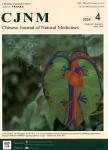Cytotoxicity and anti-inflammatory effects of root bark extracts of Acanthopanax henryi
Cytotoxicity and anti-inflammatory effects of root bark extracts of Acanthopanax henryi作者机构:Herbal Medicine Research Division Korea Food & Drug Administration Hunan Key Laboratory of Traditional Chinese Medicine modernization School of Pharmacy Hunan University of Chinese Medicine College of Pharmacy Kyung-Hee University
出 版 物:《Chinese Journal of Natural Medicines》 (中国天然药物(英文版))
年 卷 期:2014年第12卷第2期
页 面:121-125页
核心收录:
学科分类:1008[医学-中药学(可授医学、理学学位)] 1006[医学-中西医结合] 100602[医学-中西医结合临床] 10[医学]
基 金:supported by the PhD Program Open Foundation of the Food and Drug Administration of Korea Hunan Provincial Natural Science Foundation(No.11JJ2042) the Science of Pharmaceutical Analysis of Twelfth Five-Year Key Discipline Projects of Hunan University of Chinese Medicine Science of Chinese Materia Medica of Twelfth Five-Year Key Discipline Projects of Hunan Province
主 题:Acanthopanax henryi(Oliv.) Harms Root bark extract Cytotoxic activity Anti-inflammatory activity
摘 要:AIM: To investigate the cytotoxicity, anti-inflammatory activity, and action mechanism of root bark extracts of Acanthopanax henryi. METHOD: The hot methanol extract of the root bark of A. henryi was subjected to XAD-4 column chromatography eluting with a gradient of methanol in water. The cytotoxicity and anti-inflammatory effects of the MeOH fractions were evaluated on the inhibition on lipopolysaccharide(LPS)-induced nitric oxide, prostaglandin E2, interleukin-1β, and interleukin-6 production in RAW 264.7 macrophages. RESULTS: The 80% MeOH fraction was a better inhibitor of LPS-induced NO, PGE2, IL-1β, and IL-6 production, and expression of inducible nitric oxide synthase(iNOS) at the protein levels in a concentration-dependent manner. CONCLUSION: The 80% MeOH fraction of A. henryi root bark has significant anti-inflammatory activity. This provides a pharmacological basis for clinical application for the treatment of inflammation.



